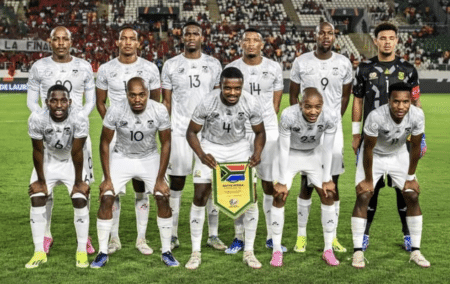Bafana Bafana won a victory over Morocco last week in the round of 16. The Moroccan side, who were World Cup semi-finalists, are ranked 13th in the world, and can draw on players from their diaspora who were born in and benefit from football systems in Spain, France, Belgium and the Netherlands.
Bafana Bafana have every chance to win this tournament, with an upcoming quarter-final clash against Cape Verde today. If they can win, it will mean South Africa are double-defending world champions at rugby, African champions at both men’s and women’s football, cricket world cup semi-finalists and a ‘top five ranked’ team at netball.
This would be remarkable, given the context and the almost pathological negativity of the South African public. Our women’s team, Banyana Banyana, won the women’s AFCON with a lot of semi-professional players, who after qualifying for the Women’s World Cup then went on to beat Italy while losing in the last minute to Sweden, who are ranked 3rd in the world. This was while qualifying for the knockout stages.
This was in a climate of players not being paid their bonuses and match fees by SAFA (ANC cadres). Patrice Motsepe stepped in and paid them. Anybody who watched that World Cup saw women who are talented enough to compete at the top end, but who are failed by a footballing association that does nothing to develop women’s football or give them the tools to compete physically and be conditioned enough to beat the top-end teams.
Eight of the eleven players playing for Bafana Bafana last night came from Patrice Motsepe’s Mamelodi Sundowns, who in the last decade have been competing at the top end of African club football regularly and bossing the South African league. Motsepe brought a level of professionalism and pay to a league filled with incompetent and hubristic management, and will no doubt do the same at CAF (the African football body) as president. Bafana Bafana outplaying and beating a team filled with players from top European clubs is not nothing.
It is instructive that the national team with the best development systems (thanks to our world-class school rugby system) is the one that has conquered the world. In that sense cricket is in a strange way underperforming considering how good our school and development systems are. Even our netball team, which has been hovering in the 4th to 5th spot in the world rankings, has struggled to break the hegemony of Australia, New Zealand and England: countries who all have pro netball leagues which pay players a professional wage and have top-class facilities and training.
The broader point for me is that South African sport does remarkably well, despite the condition of our country and the paucity of development, investment and sound management within the country itself. We can include Dricus du Plessis’s win at the UFC in this. As someone who is admittedly a South African exceptionalist and supremacist ,and who has decided to be a pathological optimist in regard to this country, I may be looking at sport with rose-coloured glasses. But the evidence is there: we have the potential as a country to compete at the top end of every team sport and even be dominant.
It does make me wonder what South Africa and her people could be if the kleptocratic and incompetent gangsters in government were voted out this year, and replaced with leadership that would prioritise the health, education, development and growth of this country.
What would South Africa be like if that happened, and even a quarter (about 250 000) of our highly-skilled expats returned because of it?
There is no doubt South Africa is in the danger zone of system collapse and failure. Other countries have been there too, from Ireland to Chile to Poland. They have, with visionary leadership and sound public policy, turned their situations around and become much more prosperous.
It is worth saying that in 1990, before the enactment of the Balcerowicz Plan, popularly known as shock therapy, Poland had half South Africa’s GDP per capita. Today the Poles have almost three times this country’s GDP per capita. Many analysts are even floating the idea that the Poles in the future could become what the Germans are now in Europe.
It is no doubt difficult to think, let alone dream of what this country could be when we have been given so little reason for optimism, and we have to watch our cities (barring Cape Town) and vital infrastructure decay in front of our eyes. Regardless, it is worth dreaming of what home could be if our very lifeblood was not being drained by a rent-seeking criminal state.
The views of the writer are not necessarily the views of the Daily Friend or the IRR
If you like what you have just read, support the Daily Friend
[Photo: FaceBook – Bafana Bafana – South Africa]

